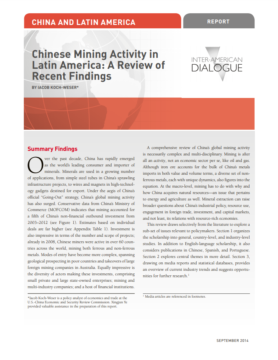Rising Brazil: The Choices Of A New Global Power
What should we expect from a newly powerful Brazil? Does the country have the capacity and leadership to be a central actor in addressing critical global and regional problems?
How does the Covid-19 pandemic affect Latin America’s insertion in the world? Last year, in Unfulfilled Promises’ chapter about this topic, we stated:
The world is becoming increasingly multipolar... In this setting, Latin America looks increasingly heterogeneous – across countries – and fragmented – across sub-regions. There are only very weak regional poles in Latin America, and Latin America is no world pole. The region remains persistently outward-oriented but increasingly centrifugal, as extra-regional poles multiply, policy areas decouple, and intra-regional heterogeneity increases. The single most relevant issue, i.e. whether China’s rising influence will nurture cooperation or conflict with the United States, and between Latin American countries, is still open.
The pandemic has changed none of the above trends. Rather, it has highlighted all of them. Let us recap: at the global level, we witness increasing multipolarity, failure of multilateral cooperation, and a Sino-American power transition; in Latin America, we observe structural heterogeneity, political fragmentation, and geopolitical irrelevance. Let us elaborate.
Increasing multipolarity characterizes a world in which the United States declines (gradually, and not without a fight), China emerges (gradually, and facing resistance), the European Union struggles to survive (rather than to remain relevant), and Russia struggles to remain relevant (rather than prevail). These four actors concentrate most of the world’s military, economic, financial, and soft power; only India is likely to join the club in the medium run. Covid-19 does not look like a turning point but rather an accelerator of these trends. In the lower layers of the global pecking order remains a group of middle powers such as Japan and Australia, a few playgrounds for the major powers such as the Middle East and Central Asia, plus two large, unstructured and peripheral regions: Africa and Latin America. More on the last two later.
The failure of multilateral cooperation is not necessarily a product of multipolarity, although it does increase global complexity. Overcoming the pandemic might require sustained international cooperation, but countries’ first responses have strengthened national isolation. The impact of these cross-incentives on international organizations has been deleterious, albeit asymmetrical. Although almost none were up to the task, general-purpose (aka political) organizations responded worse than task-specific (aka specialized) organizations. Thus, the United Nations (UN) played almost no role in the promotion of coordinated responses, while the criticized World Health Organization (WHO) nonetheless became a focal point for most states. Two lessons can be provisionally drawn. The first is that, when push comes to shove, functional cooperation tends to be more effective than political cooperation. This is consistent with Latin America’s historical record and present situation, in which specialized organizations such as the Inter-American Development Bank (IADB) or the Development Bank of Latin America (CAF) are likely to be more relevant for post-pandemic reconstruction than political organizations such as the Organization of American States (OAS) or the Community of Latin American and Caribbean States (CELAC). The second lesson is that the separation of politics and functions might lead to a decoupled globalization, in which the spheres of influence of the United States and China are divided by specialized technology rather than political ideology. If “globalized globalization” did not free Latin America from dependency nor put the region on the path to development, decoupled globalization does not bode any better. This is because, for Latin America, decoupling means the freedom to choose between a Western rock and an Asian hard place.
The Sino-American power transition may be a game-changer for Latin America. Historically placed under the umbrella of the Monroe Doctrine, the region is now being torn apart by opposite centrifugal forces. The battlefield is not military in nature, though. China and the United States are likely to develop partially incompatible technical standards and technological networks that will define areas of influence and shape global exchanges. The world might be splitting not between liberalism and communism, but between ‘Mac and PC’, echoing the computer incompatibilities of yesteryear in which being left out or occupying a middle ground is not an option. Alignment with either pole has a cost, because the United States will likely continue to reign militarily and control the global currency while China will define commodity prices and decide on massive foreign investment flows. If the G7 and G20 are impaired for good, as their vanishing in the current predicament suggests, is global governance going to be provided by a cooperative G2 or neglected by an entropic G0? Latin American states would not be important players in either formula, but they would be more deeply harmed by the latter. In both scenarios, though, diversification of partners and strategies seems preferable to bandwagoning (with either side) or all-in-one-basket strategies.
In Latin America, structural heterogeneity means that an event that is common to all countries, such as the pandemic, will not affect every country in the same way. Local contexts are likely to bifurcate the impact of a global driver. Furthermore, while developed countries face twin health and economic crises, developing countries face a threefold crisis: health, economic, and social – and it will inevitably turn political! The reason is that the informality of labor markets and the precariousness of welfare states multiply the hardships and make responses more difficult. Although an effective response to the emergency and reconstruction may require stronger states, it takes a long time to build state capacity. In addition, the pandemic might encourage the strengthening of state power, but this power comes in two types: despotic and infrastructural. Despotic power is the ability of the state to act coercively without legal or constitutional constraints; infrastructural power refers to the ability of the state penetrate society and organize social relations. States do not always take care of their citizens; they might also kill them – by action if they are authoritarian, by omission if they are weak. Effective state apparatuses (with high levels of infrastructural power) do exist in some parts of Latin America, but they have been historically rarer than authoritarian and weak states. In a nutshell, the pandemic may strengthen very different types of states, pushing Latin American countries further away from each other.
Political fragmentation no longer makes the news across Latin America: it has become routine. The proliferation of regional organizations has turned from tragedy to farce, as UNASUR was massively abandoned and replaced by an illusory PROSUR. In contrast with global trends and in opposition to the lessons drawn above, most Latin American leaders still think that political organizations outdo specialized organizations – or that they are easier to rein in. The outcome is grim: as the cadavers of regional organizations mount, results remain stillborn. A predictable development is that a few countries may opt to turn their backs on regional organizations of all types and look for extra-regional, more reliable partners instead. Chile has long blinked in this direction, others may soon follow suit. Considering that the European Union itself lives permanently on the brink, it is hard to blame those who believe that tying oneself to one’s neighbors provides little guarantee of stability. Yet, there is one reason why regional cooperation may still matter: to face illegal threats. Drug trafficking, organized crime, large-scale smuggling, cross-border guerrillas, and massive migration flow are unsolvable problems for individual states. The prevention of common problems, rather than the promotion of common goods, offers regional organizations another chance to prove their usefulness.
In the end, how much does Latin America matter in the world? A comparison is in order. The African continent is home to about one fifth of humankind. Current demographic trends suggest that, by 2050, the continent has the potential to become the main driver of global economic growth. On the other hand, natural catastrophes or massive policy failures can transform it into a time bomb, with millions of people just a boat away from aging Europe. This means that, for good or bad reasons, Africa is geopolitically relevant: it might push the world forward or bring it down. Latin America stands in a different situation in both regards. With lower rates of demographic and economic growth, it is not projected to weigh much heavier in the global future. Likewise, it has less potential to cause damage, as its capacity to transfer its problems to the prosperous Northern countries is limited by geography. In short, Latin America offers both a lesser promise and lesser threat than Africa: this is the definition of geopolitical irrelevance.
The good news is that geopolitical irrelevance can sometimes protect you. Indeed, it preserved Latin America from destruction during both world wars. The bad news is that current global threats, such as climate change, pandemics, and cyberwarfare, are blind to geography and, in two of three cases, also to political alignments. International cooperation is as necessary today as it has ever been, but it is in very short supply. The world and the region need new, fresh ideas to foster collaboration. The first condition to nurture these ideas is to stop denying reality and understand the world as it is.
In 2019 the Dialogue published Unfulfilled Promises: Latin America Today, a collection of six essays analyzing six of the region’s most salient challenges: rule of law and democratic institutions; citizen security; poverty and inequality; economic growth; regional integration; and global insertion. The volume was edited by Dialogue president Michael Shifter and fellow Bruno Binetti, with an introduction by Laura Chinchilla, former president of Costa Rica and current Dialogue co-chair. It was published in English, Spanish and Portuguese, with launching events in Washington DC, Mexico and Rio de Janeiro, respectively.
The book is available in English, Spanish, and Portuguese.
Andrés Malamud explored in his chapter "Latin America and the World: Dependency, Decoupling, Dispersion" the repercussions of shifts in global power for Latin America, including an emerging China and political changes in the United States.
More than one year after the publication of the book, the Covid-19 pandemic has upended the world. How does the new environment affect Latin America, and what are its impacts on the six issues explored in the volume? To answer this fundamental question, we asked each author to reflect on the implications of the public health and economic crises for Latin America’s future.
What should we expect from a newly powerful Brazil? Does the country have the capacity and leadership to be a central actor in addressing critical global and regional problems?
China has rapidly emerged as the world’s leading consumer and importer of minerals.
Despite slowing economic growth in China, the country’s banks remain a primary source of finance for certain Latin American nations.
 Andrey Grushnikov / Pexels
Andrey Grushnikov / Pexels

 Video
Video